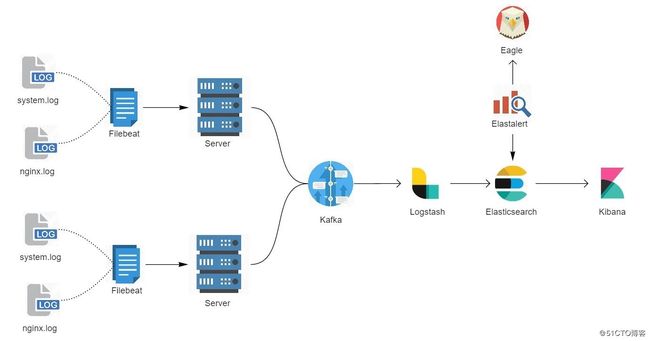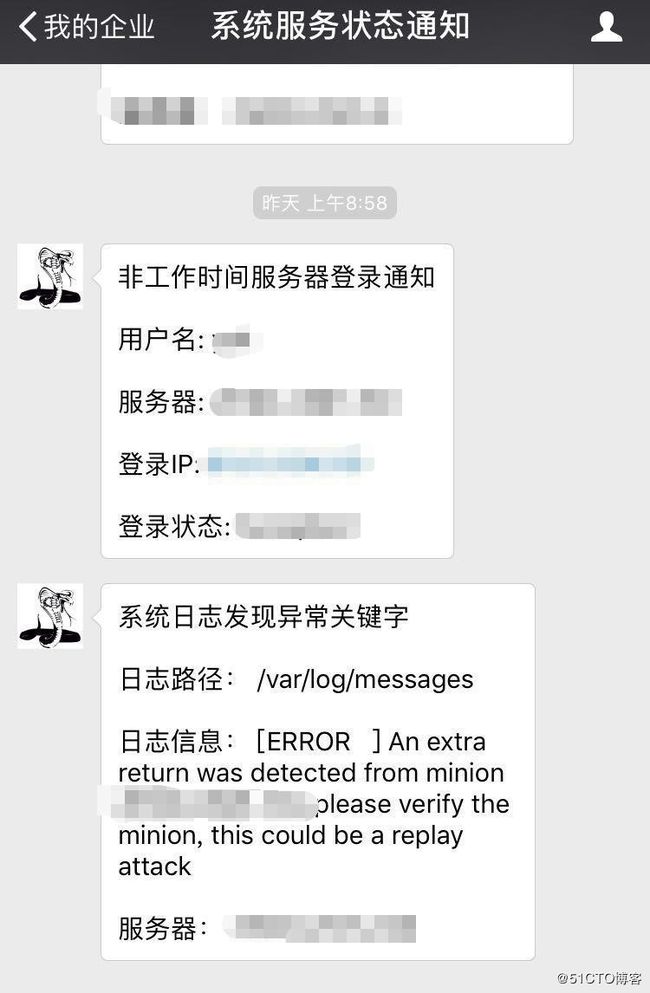前言
运维故障排障速度往往与监控系统体系颗粒度成正比,监控到位才能快速排障
在部署这套系统之前,平台所有系统日志都由Graylog+Zabbix,针对日志出现的错误关键字进行告警,这种做法在运维工作开展过程中暴露出多个不足点,不详述;在考虑多方面原因后,最终对日志告警系统进行更换,选用的方案是:ELK + Kafka+ Filebeat + Elastalert
本文主要以两个需求为主轴做介绍
- 非工作时间服务器异常登录告警
- 系统日志出现错误关键字告警
架构
服务选型
| name | version | info |
|---|---|---|
| Amazon Elasticsearch Service | v6.2 | AWK官网部署教程 |
| Logstash | v6.2.3 | 选用与ES相同版本 |
| Filebeat | v6.2.3 | 选用与ES相同版本 |
| Confluent(Kafka) | v4.0 | 这里推荐 Confluent 的版本,Confluent 是 kafka 作者 Neha Narkhede 从 Linkedin 出来之后联合 LinkedIn 前员工创建的大数据公司,专注于 kafka 的企业应用。 |
| Elastalert | v0.1.29 | 原先考虑采用X-Pack但由于AWS目前还不支持 |
部署
本文采用的操作系统 :CentOS release 6.6
Filebeat
# 下载源
$ curl -L -O https://artifacts.elastic.co/downloads/beats/filebeat/filebeat-6.2.3-x86_64.rpm
# 安装
$ sudo rpm -vi filebeat-6.2.3-x86_64.rpmLogstash
# 导入Yum源
$ rpm --import https://artifacts.elastic.co/GPG-KEY-elasticsearch
$ cat < /etc/yum.repos.d/logstash.repo
[logstash-6.x]
name=Elastic repository for 6.x packages
baseurl=https://artifacts.elastic.co/packages/6.x/yum
gpgcheck=1
gpgkey=https://artifacts.elastic.co/GPG-KEY-elasticsearch
enabled=1
autorefresh=1
type=rpm-md
EOF
# 安装
yum install logstash -y Elastalert
# pip直接安装
$ pip install elastalert
# 如果出现依赖包报错,以下为常用开发所需依赖包
$ yum install -y zlib openssl openssl-devel gcc gcc-c++ Xvfb libXfont Xorg libffi libffi-devel python-cffi python-devel libxslt-devel libxml2-devel zlib-devel bzip2-devel xz-libs wget配置
Filebeat
/etc/filebeat/filebeat.yml
filebeat.config:
prospectors:
path: /etc/filebeat/conf/*.yml
reload.enabled: true
reload.period: 10s
output.kafka:
# kafkaNode为Kafaka服务所在服务器
hosts: ["kafkaNode:9092"]
# 索引取fields.out_topic
topic: "%{[fields][out_topic]}"
partition.round_robin:
reachable_only: false
/etc/filebeat/conf/base.yml
# 收集系统日志
- type: log
paths:
- /var/log/messages
- /var/log/syslog*
exclude_files: [".gz$"]
exclude_lines: ["ssh_host_dsa_key"]
tags: ["system_log"]
scan_frequency: 1s
fields:
# 新增字段用于辨别来源客户端
server_name: client01
# 索引
out_topic: "system_log"
multiline:
pattern: "^\\s"
match: after
# 收集登录日志
- type: log
paths:
- /var/log/secure*
- /var/log/auth.log*
tags: ["system_secure"]
exclude_files: [".gz$"]
scan_frequency: 1s
fields:
server_name: client01
out_topic: "system_secure"
multiline:
pattern: "^\\s"
match: afterLogstash
/etc/logstash/conf.d/system_log.conf
input {
kafka {
bootstrap_servers => "kafkaNode:9092"
consumer_threads => 3
topics => ["system_log"]
auto_offset_reset => "latest"
codec => "json"
}
}
filter {
# 排除logstash日志
if [source] == "/var/log/logstash-stdout.log" {
drop {}
}
if [fields][out_topic] == "system_log" {
date {match => [ "[system][syslog][timestamp]", "MMM d HH:mm:ss", "MMM dd HH:mm:ss" ]}
grok {
match => { "message" => ["%{SYSLOGTIMESTAMP:[system][syslog][timestamp]} %{SYSLOGHOST:[system][syslog][hostname]} %{DATA:[system][syslog][program]}(?:\[%{POSINT:[system][syslog][pid]}\])?: %{GREEDYMULTILINE:[system][syslog][message]}"] }
pattern_definitions => { "GREEDYMULTILINE" => "(.|\n)*" }
remove_field => "message"
}
}
}
output {
elasticsearch {
hosts => ["<亚马逊ES地址>"]
index => "%{[fields][out_topic]}_%{+YYYYMMdd}"
document_type => "%{[@metadata][type]}"
}
}
/etc/logstash/conf.d/secure_log.conf
input {
kafka {
bootstrap_servers => "kafkaNode:9092"
consumer_threads => 3
topics => ["system_secure"]
auto_offset_reset => "latest"
codec => "json"
}
}
filter {
if [fields][out_topic] == "system_secure" {
grok {
match => { "message" => ["%{SYSLOGTIMESTAMP:[system][auth][timestamp]} %{SYSLOGHOST:[system][auth][hostname]} sshd(?:\[%{POSINT:[system][auth][pid]}\])?: %{DATA:[system][auth][ssh][event]} %{DATA:[system][auth][ssh][method]} for (invalid user )?%{DATA:[system][auth][user]} from %{IPORHOST:[system][auth][ssh][ip]} port %{NUMBER:[system][auth][ssh][port]} ssh2(: %{GREEDYDATA:[system][auth][ssh][signature]})?",
"%{SYSLOGTIMESTAMP:[system][auth][timestamp]} %{SYSLOGHOST:[system][auth][hostname]} sshd(?:\[%{POSINT:[system][auth][pid]}\])?: %{DATA:[system][auth][ssh][event]} user %{DATA:[system][auth][user]} from %{IPORHOST:[system][auth][ssh][ip]}",
"%{SYSLOGTIMESTAMP:[system][auth][timestamp]} %{SYSLOGHOST:[system][auth][hostname]} sshd(?:\[%{POSINT:[system][auth][pid]}\])?: Did not receive identification string from %{IPORHOST:[system][auth][ssh][dropped_ip]}",
"%{SYSLOGTIMESTAMP:[system][auth][timestamp]} %{SYSLOGHOST:[system][auth][hostname]} sudo(?:\[%{POSINT:[system][auth][pid]}\])?: \s*%{DATA:[system][auth][user]} :( %{DATA:[system][auth][sudo][error]} ;)? TTY=%{DATA:[system][auth][sudo][tty]} ; PWD=%{DATA:[system][auth][sudo][pwd]} ; USER=%{DATA:[system][auth][sudo][user]} ; COMMAND=%{GREEDYDATA:[system][auth][sudo][command]}",
"%{SYSLOGTIMESTAMP:[system][auth][timestamp]} %{SYSLOGHOST:[system][auth][hostname]} groupadd(?:\[%{POSINT:[system][auth][pid]}\])?: new group: name=%{DATA:system.auth.groupadd.name}, GID=%{NUMBER:system.auth.groupadd.gid}",
"%{SYSLOGTIMESTAMP:[system][auth][timestamp]} %{SYSLOGHOST:[system][auth][hostname]} useradd(?:\[%{POSINT:[system][auth][pid]}\])?: new user: name=%{DATA:[system][auth][user][add][name]}, UID=%{NUMBER:[system][auth][user][add][uid]}, GID=%{NUMBER:[system][auth][user][add][gid]}, home=%{DATA:[system][auth][user][add][home]}, shell=%{DATA:[system][auth][user][add][shell]}$",
"%{SYSLOGTIMESTAMP:[system][auth][timestamp]} %{SYSLOGHOST:[system][auth][hostname]} %{DATA:[system][auth][program]}(?:\[%{POSINT:[system][auth][pid]}\])?: %{GREEDYMULTILINE:[system][auth][message]}"] }
pattern_definitions => {"GREEDYMULTILINE"=> "(.|\n)*"}
remove_field => "message"
}
}
}
output {
elasticsearch {
hosts => ["<亚马逊ES地址>"]
index => "%{[fields][out_topic]}_%{+YYYYMMdd}"
document_type => "%{[@metadata][type]}"
}
}
Kafka
# 导入
rpm --import https://packages.confluent.io/rpm/4.0/archive.key
cat < /etc/yum.repos.d/confluent.repo
[Confluent.dist]
name=Confluent repository (dist)
baseurl=https://packages.confluent.io/rpm/4.0/6
gpgcheck=1
gpgkey=https://packages.confluent.io/rpm/4.0/archive.key
enabled=1
[Confluent]
name=Confluent repository
baseurl=https://packages.confluent.io/rpm/4.0
gpgcheck=1
gpgkey=https://packages.confluent.io/rpm/4.0/archive.key
enabled=1
EOF
yum install confluent-platform-oss-2.11 Elastalert
Elastalert可以部署到任何一台能够读取到ES的服务器上;配置文件中
modules.eagle_post.EagleAlerterblacklist_v2经过修改,后面会介绍到
rules/system_log.yaml
es_host: <亚马逊ES地址>
es_port: 80
name: system log rule
type: blacklist_v2
index: system_log*
timeframe:
minutes: 1
# 监控key
compare_key: system.syslog.message
# 出现下面任意关键字将告警,按需添加
blacklist_v2:
- "ERROR"
- "error"
alert: "modules.eagle_post.EagleAlerter"
eagle_post_url: ""
eagle_post_all_values: False
eagle_post_payload:
server: "fields.server_name"
info: "system.syslog.message"
source: "source" rules/system_log.yaml
es_host: <亚马逊ES地址>
es_port: 80
name: system secure rule
type: frequency
index: system_secure*
num_events: 1
timeframe:
minutes: 1
filter:
- query:
wildcard:
system.auth.user : "*"
alert: "modules.eagle_post.EagleAlerter"
eagle_post_url: ""
eagle_post_all_values: False
# 非工作时间
eagle_time_start: "09:00"
eagle_time_end: "18:00"
eagle_post_payload:
user: "system.auth.user"
server: "fields.server_name"
ip: "system.auth.ssh.ip"
event: "system.auth.ssh.event"
Elastalert
自定义type与alert
为了能够将告警接入到Eagle(自研统一接口平台)在尝试使用http_post做告警类型过程中,发现无法传入ES结果作为POST参数,所以对其进行简单修改,新增类型,实现能够无缝接入Eagle
Alert
moudules/eagle_post.py
将文件夹保存到
site-packages/elastalert
import json
import requests
import dateutil.parser
import datetime
from elastalert.alerts import Alerter
from elastalert.util import EAException
from elastalert.util import elastalert_logger
from elastalert.util import lookup_es_key
class EagleAlerter(Alerter):
def __init__(self, rule):
super(EagleAlerter, self).__init__(rule)
# 设定时间有效范围
self.post_time_start = self.rule.get('eagle_time_start','00:00')
self.post_time_end = self.rule.get('eagle_time_end','00:00')
# post链接
self.post_url = self.rule.get('eagle_post_url','')
self.post_payload = self.rule.get('eagle_post_payload', {})
self.post_static_payload = self.rule.get('eagle_post_static_payload', {})
self.post_all_values = self.rule.get('eagle_post_all_values', False)
self.post_lock = False
def alert(self, matches):
if not self.post_url:
elastalert_logger.info('Please input eagle url!')
return False
for match in matches:
# 获取所有payload
payload = match if self.post_all_values else {}
# 构建字典
for post_key, es_key in self.post_payload.items():
payload[post_key] = lookup_es_key(match, es_key)
# 获取当前时间
login_time = datetime.datetime.now().time()
# 获取时间限制
time_start = dateutil.parser.parse(self.post_time_start).time()
time_end = dateutil.parser.parse(self.post_time_end).time()
# 如果在时间范围内,将不做告警
self.post_lock = False if login_time > time_start and \
login_time < time_end else True
# 合并两种类型payload
data = self.post_static_payload
data.update(payload)
# 发送告警
if self.post_lock:
myRequests = requests.Session()
myRequests.post(url=self.post_url,data=data,verify=False)
elastalert_logger.info("[-] eagle alert sent.")
else:
elastalert_logger.info("[*] nothing to do.")
def get_info(self):
return {'type': 'http_post'}type
在使用blaklist过程发现改类型是全匹配,为了方便编写配置文件,所以对其做了简单修改
elastalert/ruletypes.py
# 新增
class BlacklistV2Rule(CompareRule):
required_options = frozenset(['compare_key', 'blacklist_v2'])
def __init__(self, rules, args=None):
super(BlacklistV2Rule, self).__init__(rules, args=None)
self.expand_entries('blacklist_v2')
def compare(self, event):
term = lookup_es_key(event, self.rules['compare_key'])
# 循环配置文件, 这种做法对性能有一定的损耗,在没找到更合适的解决方案前,就采取这种方式
for i in self.rules['blacklist_v2']:
if i in term:
return True
return Falseelastalert/config.py
# 新增
rules_mapping = {
'frequency': ruletypes.FrequencyRule,
'any': ruletypes.AnyRule,
'spike': ruletypes.SpikeRule,
'blacklist': ruletypes.BlacklistRule,
'blacklist_v2': ruletypes.BlacklistV2Rule,
'whitelist': ruletypes.WhitelistRule,
'change': ruletypes.ChangeRule,
'flatline': ruletypes.FlatlineRule,
'new_term': ruletypes.NewTermsRule,
'cardinality': ruletypes.CardinalityRule,
'metric_aggregation': ruletypes.MetricAggregationRule,
'percentage_match': ruletypes.PercentageMatchRule,
}
elastalert/schema.yaml
# 新增
- title: BlacklistV2
required: [blacklist_v2, compare_key]
properties:
type: {enum: [blacklist_v2]}
compare_key: {'items': {'type': 'string'},'type': ['string', 'array']}
blacklist: {type: array, items: {type: string}}
打进Docker
做了个简单DockerFile做参考
FROM python:2.7-alpine
ENV SITE_PACKAGES /usr/local/lib/python2.7/site-packages/elastalert
WORKDIR /opt/elastalert
RUN apk update && apk add gcc ca-certificates openssl-dev openssl libffi-dev gcc musl-dev tzdata openntpd && \
pip install elastalert && cp -rf /usr/share/zoneinfo/Asia/Taipei /etc/localtime
COPY ./ /opt/elastalert
CMD ["/opt/elastalert/start.sh"]start.sh
#!/bin/sh
SITE_PATH=/usr/local/lib/python2.7/site-packages/elastalert
CONFIG=/opt/elastalert/config/config.yaml
MODULES=/opt/elastalert/modules
if [ -n "${MODULES}" ]
then
\cp -rf ${MODULES} ${SITE_PATH}
echo "[-] Copy ${MODULES} to ${SITE_PATH}"
fi
\cp -rf elastalert/* ${SITE_PATH}/
echo "[-] Copy elastalert/* to ${SITE_PATH}"
python -m elastalert.elastalert --verbose --config ${CONFIG}基础工作准备就绪,加入Bee容器管理平台完成自动构建。
实现效果
碰到的坑
Zookeeper
问题描述
老版
Kafaka依赖Zookeeper,默认安装时注册地址为:localhost,导致问题的现象:
filebeat错误日志
2018-04-25T09:14:55.590+0800 INFO kafka/log.go:36 client/metadata fetching metadata for [[[system_log] kafkaNode:9092]] from broker %!s(MISSING)
2018-04-25T09:14:55.591+0800 INFO kafka/log.go:36 producer/broker/[[0]] starting up
2018-04-25T09:14:55.591+0800 INFO kafka/log.go:36 producer/broker/[[0 %!d(string=system_log) 0]] state change to [open] on %!s(MISSING)/%!d(MISSING)
2018-04-25T09:14:55.591+0800 INFO kafka/log.go:36 producer/leader/[[system_log %!s(int32=0) %!s(int32=0)]]/%!d(MISSING) selected broker %!d(MISSING)
2018-04-25T09:14:55.591+0800 INFO kafka/log.go:36 producer/leader/[[system_secure %!s(int32=0) %!s(int=3)]]/%!d(MISSING) state change to [retrying-%!d(MISSING)]
2018-04-25T09:14:55.591+0800 INFO kafka/log.go:36 producer/leader/[[system_secure %!s(int32=0) %!s(int32=0)]]/%!d(MISSING) abandoning broker %!d(MISSING)
2018-04-25T09:14:55.592+0800 INFO kafka/log.go:36 producer/broker/[[0]] shut down
2018-04-25T09:14:55.592+0800 INFO kafka/log.go:36 Failed to connect to broker [[localhost:9092 dial tcp [::1]:9092: getsockopt: connection refused]]: %!s(MISSING)
日志出现两个地址,一个是kafka地址,另外出现一个localhost地址。
这是因为filebeat已经跟kafaka建立了连接,但是从kafaka到zookeeper这一段找不到
解决方法
# get /brokers/ids/0
{"listener_security_protocol_map":{"PLAINTEXT":"PLAINTEXT"},"endpoints":["PLAINTEXT://localhost:9092"],"jmx_port":-1,"host":"localhost","timestamp":"1523429158364","port":9092,"version":4}
cZxid = 0x1d
ctime = Wed Apr 11 14:45:58 CST 2018
mZxid = 0x1d
mtime = Wed Apr 11 14:45:58 CST 2018
pZxid = 0x1d
cversion = 0
dataVersion = 0
aclVersion = 0
ephemeralOwner = 0x162b374170d0000
dataLength = 188
numChildren = 0
# 发现注册地址是localhost,修改之
set /brokers/ids/0 {"listener_security_protocol_map":{"PLAINTEXT":"PLAINTEXT"},"endpoints":["PLAINTEXT://kafkaNode:9092"],"jmx_port":9999,"host":"kafkaNode","timestamp":"1523429158364","port":9092,"version":4}修改完重启,问题解决。
博文链接:http://a-cat.cn/2018/04/29/aws-elk/

